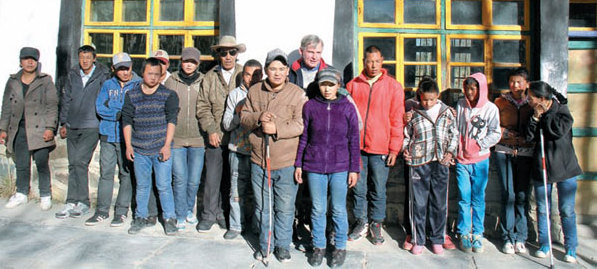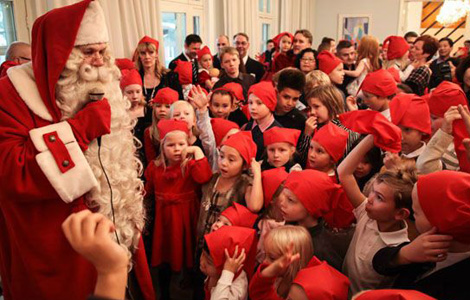Growing together
Updated: 2013-12-10 07:36
By Palden Nyima (China Daily)
|
||||||||
My China Dream | Mike Parent
Ten years ago, Mike Parent arrived in the Tibet autonomous region to teach at the Braille Without Borders vocational school. Palden Nyima finds out why the Canadian intends to stay here until the end of his days.
The sky stretched out clear and bright above our heads as we approached the remote village nestled among willows and fields high in the mountains.
|
Mike Parent poses with his students at the Braille Without Borders vocational school in Xigaze, the Tibet autonomous region. Provided to China Daily |
There was the laughter of children and the smell of butter tea as we arrived at the school we had arranged to visit, which was easy to spot, as "Braille Without Borders" was written conspicuously on a wall in three languages.
The man we have come to interview, a Canadian who has lived here for almost 10 years, and who intends to be buried here, warmly welcomed us with the traditional Tibetan greeting, "tashidelek", and cups of tea.
When Mike Parent first came to Baishung township in Xigaze prefecture in the Tibet autonomous region to teach at the Braille Without Borders vocational school, the children called him an old monkey because of his hairy arms. Now, after almost a decade of "being together 24 hours a day, seven days a week", the 70-year-old is called "chigyal pola" - which means "foreign grandpa".
"At the beginning they called me here because they needed me. Now 10 years later they don't need me, they want me to stay because they love me," he says.
It was a chance encounter that brought Parent to Baishung. He met Sabriye Tenberken, the German woman who co-founded Braille Without Borders, when he was studying the Tibetan language and culture at Tibet University from 1998 to 2000.
He started by aiding the school financially, but when she asked him if he would be interested in teaching organic farming to visually impaired people in Tibet, Parent immediately agreed. In 2005, he started showing how to plant vegetables and crops on a very small piece of land.
According to Parent, with 1-square-meter of land, visually impaired people need only to stretch out their hands to cultivate and harvest vegetables.
The school has six greenhouses for planting crops, and 12 mini greenhouses that they use for teaching. And Parent also teaches the students how to produce organic fertilizer.
"We feed 100 people three meals a day ourselves," says Parent proudly.
According to official statistics, 30,000 of the 2.5 million inhabitants of the Tibet autonomous region are visually impaired. Compared to most areas in the world, this is well above the average ratio. "Before I came to the blind village, I had never seen the brighter world. I am happy here because I found equality here," says Tsering, 35, from Tibet's Shannan prefecture, who lost his sight four years ago.
Parent says many adult visually impaired people such as Tsering really love the community and are reluctant to leave.
"It is one of our difficulties. The donors don't want it to be a retirement home for blind people. But after they have learned how to make bread and it is time to leave, they find it hard to say goodbye."
But he says the purpose of the vocational center is to improve the students' self-esteem and help them become contributing members of society.
Teaching organic farming is just one of the things Parent does at the vocational school. He also teaches animal husbandry and every evening after supper, he teaches English. He is also a fitness coach to the children.
Every morning, he gets up early and opens the gym and takes the visually impaired children through some exercises and teaches them to use the various sports equipment available.
"Most of them are still young, they need to move frequently. I don't want to see them sitting in a corner all the time," he says.
Such dedication is appreciated by the students and those who work with him.

"Parent always thinks about others," says Ardon Ngawang Drolma, 38, the school principal. "He spends all his money on others and doesn't have any savings. Once, I found he only had 10 yuan ($1.63) in his pocket."
"He told us simply one day that we should bury him on top of the hill after he died," she adds. "That is unforgettable."
"They can live without me, but I think I cannot live without them. In my heart, they are part of my family," Parent says.
When the interview ended, with his rough chapped hands, he shook hands with us, a big smile on his face.
Contact the writer at palden_nyima@chinadaily.com.cn.
(China Daily 12/10/2013 page19)

 Obama shakes hands with Cuban president Castro
Obama shakes hands with Cuban president Castro
 S Africa holds memorial service for Mandela
S Africa holds memorial service for Mandela
 World Cup mascot makes China debut
World Cup mascot makes China debut
 Catering to Chinese viewers a hurdle for Hollywood
Catering to Chinese viewers a hurdle for Hollywood
 World's top leaders pay tribute to Mandela
World's top leaders pay tribute to Mandela
 Art students take protest to the mall
Art students take protest to the mall
 German DHL testing delivery drones
German DHL testing delivery drones
 Fire breaks out at construction site in SW China
Fire breaks out at construction site in SW China
Most Viewed
Editor's Picks

|

|

|

|

|

|
Today's Top News
S Africa holds memorial service for Mandela
US Senate extends gun ban
Call for US unemployment benefits extension
Google bus blocked in San Francisco protest
John Kerry to visit Mideast, Vietnam, Philippines
Obama, Bush embark for Mandela memorial
Girl's death spark calls for child services oversight
US urged to change surveillance laws
US Weekly

|

|








